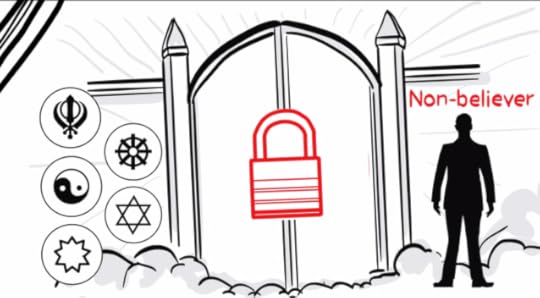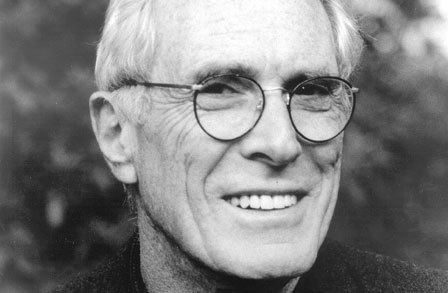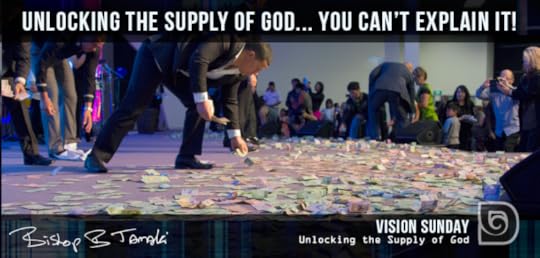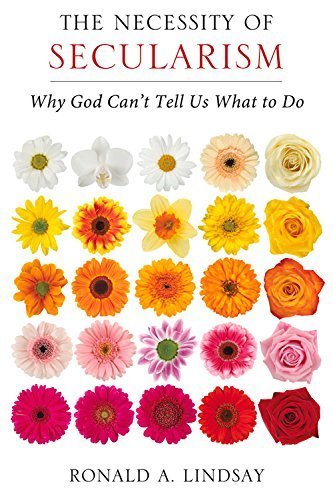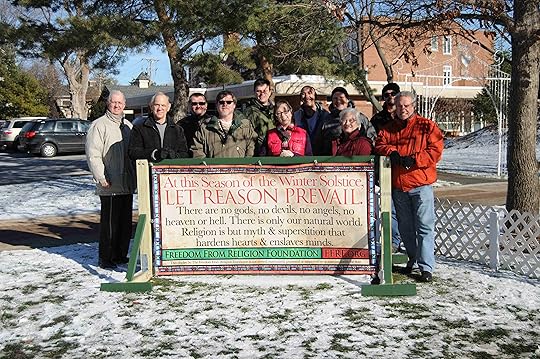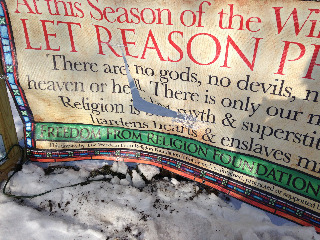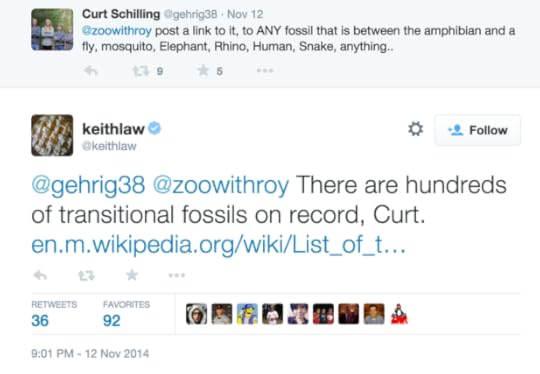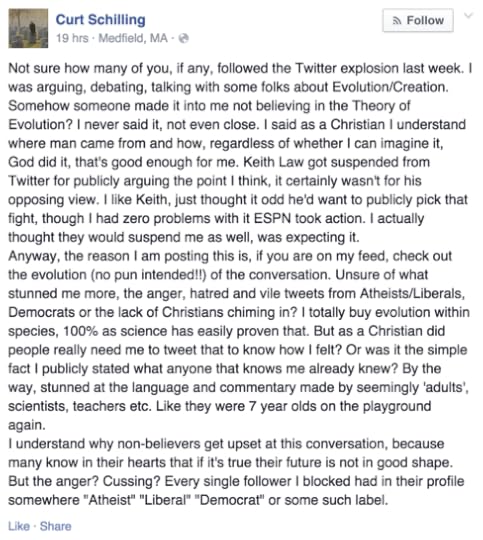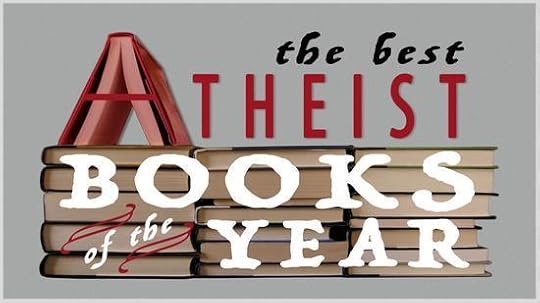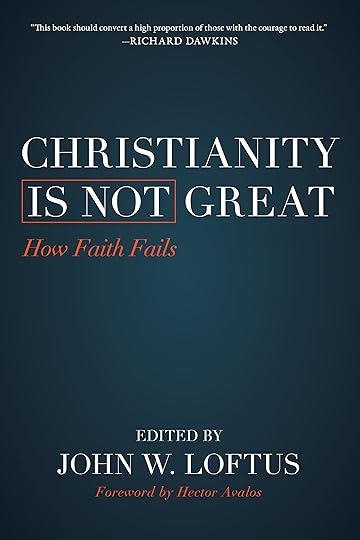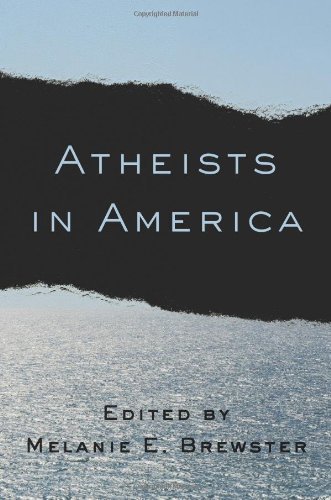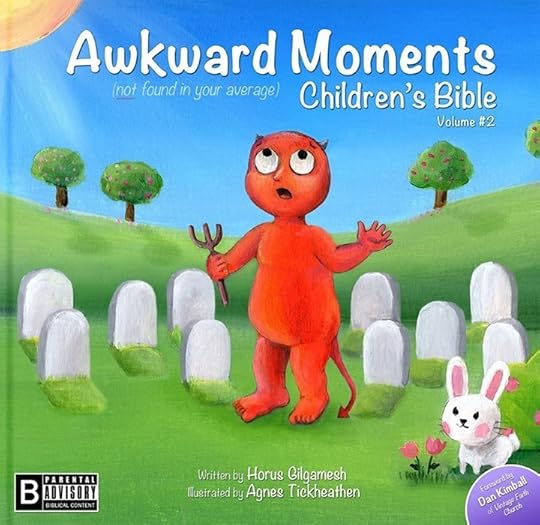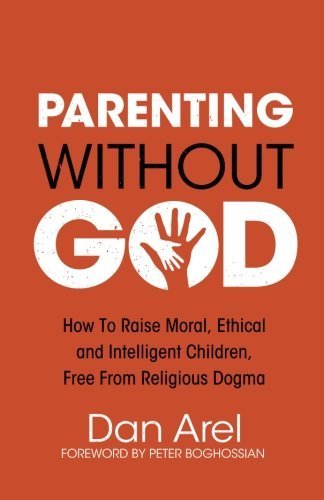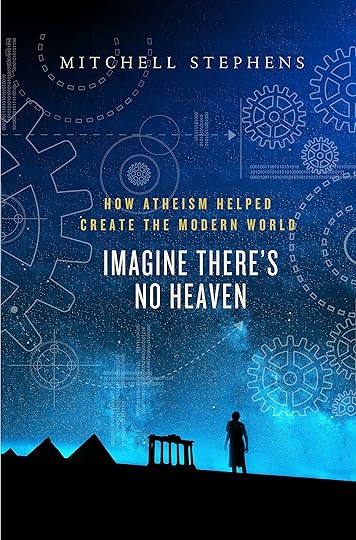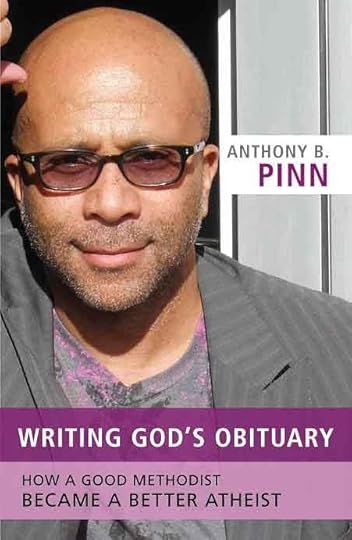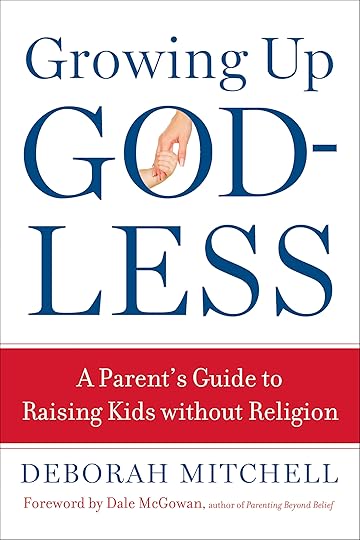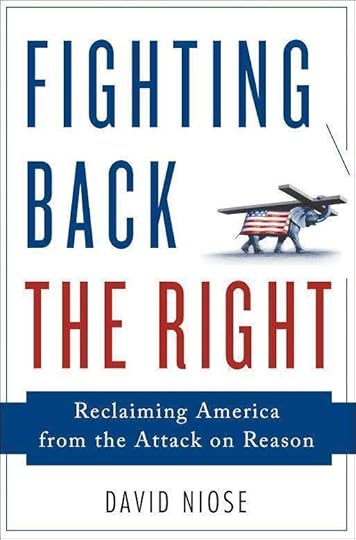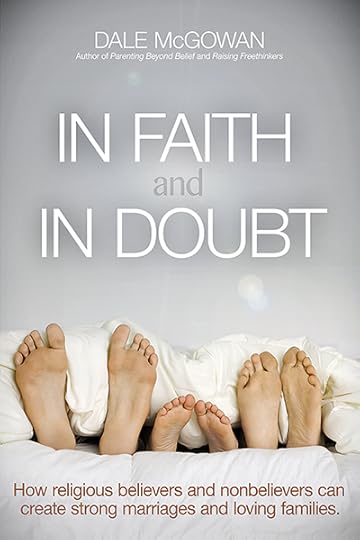Hemant Mehta's Blog, page 1861
December 2, 2014
Who’s Getting Into Heaven? Not You, That’s for Damn Sure
Who gets to go to Heaven?
Sure, we’re locked out of it:
But what about True Believers?
The Pearly Gates are closed to them, too, as this video by Atheists Ally suggests:
I guess we should just enjoy the life we have now…
December 1, 2014
Atheist Poet Laureate Mark Strand Died This Weekend
Pulitzer Prize-winning Poet Laureate Mark Strand (below) died on Saturday at the age of 80:
Even if you weren’t familiar with his work, the obituaries about him mention how seriously he took his atheism:
The most profound absence in his work was that of God, his atheism passed down to him from his father, who had terrified his young son with stories of heretics burned at the stake. In “Poem After the Last Seven Words,” from his 2006 collection “Man and Camel,” Strand imagined how it felt “to open the dictionary of the Beyond and discover what one suspected, that the only word in it is nothing.”
“I haven’t met God and I haven’t been to heaven, so I’m skeptical,” he told the AP. “Nobody’s come back to me to tell me they’re having a great time in heaven and that they’ve seen God, although there are a lot of people claiming that God is telling them what to do. I have no idea how God talks to them. Maybe they’re getting secret emails.”
Actually, God did appear in at least one of his poems, but not in a flattering way:
In 1980’s Selected Poems, Strand relies on an “ethereal, cumulative effect” to express the idea that “the two fixed points of a man’s life are the self and God; both are darknesses, one leading to another”…
What’s clear through his poetry, though, is that he didn’t have to talk about religion to raise serious questions about our lives and what brings us meaning:
“He is not a religious poet on the face of it, but he fits into a long tradition of meditation and contemplation,” said David Kirby, the author of “Mark Strand and the Poet’s Place in Contemporary Culture” and a professor of English at Florida State University. “He makes you see how trivial the things of this world are, and how expansive the self is, once you unhook it from flat-screen TVs and iPhones.” Reading Mr. Strand, he said, “We learn what a big party solitude is.”
Here’s hoping his legacy is a long-lasting one.
Friendly Atheist Podcast Episode 31: Lucien Greaves, Spokesperson for The Satanic Temple
Our latest podcast guest is Lucien Greaves, spokesperson for The Satanic Temple:
You know his organization because they’ve been very active recently regarding church/state separation issues. In Oklahoma, where there was a Ten Commandments monument near the Capitol building, Greaves’ group requested putting up a statue of Baphomet… leading to all sorts of chaos. They’ve also tried to put up a Satanic display in the Florida Capitol building. And, my favorite, after a Florida school district allowed an outside group to do a Bible giveaway for students, they requested to distribute a Satanic coloring book… which may lead to an end to outside book distributions for good in that district.
We spoke with Lucien about how he doesn’t actually believe in Satan, what his group’s relationship is like with other Satanic groups, and why they conducted a Pink Mass over the grave of Fred Phelps‘ mother.
We’d love to hear your thoughts on the podcast. If you have any suggestions for people we should chat with, please leave them in the comments, too.
You can subscribe to the podcast on iTunes, get the MP3 directly, check it out on Stitcher, or just listen to the whole thing below.
And if you like what you’re hearing, please consider supporting this site on Patreon and leaving us a positive rating!
New Zealand Government Says No to Church’s Charter School Plans Fearing Religious Coercion of Students
When a church applies to run a taxpayer-funded charter school, does anyone seriously trust them to do the right thing? They almost did in New Zealand until the evidence showed otherwise:
A real image from Destiny Church’s Facebook page
Destiny Church’s failed attempt to set up a charter school was blocked in part because of Ministry of Education fears about students being pressured into joining the church.
…
The ministry discovered irregularities between Destiny’s claim that they were open to non-church members, as school-goers were also expected to attend the church.
…
“[Destiny] anticipated that those students who were not church members when they joined the school were likely to join the church because of the ‘relational engagement’ that takes place by the school staff with their families outside of school hours.”
Shocking. A church-run school that’s more interested in finding converts than educating children…
The same church’s private school is still hoping to get government funding, which is allowed in the country, but they face the same hurdles:
… The Education Ministry documents were released to the Herald on Sunday as it decides whether to allow Destiny’s private school to enter the state school system, and gain a significant boost in taxpayer funding. Katrina Casey, head of sector enablement and support, said the application process for integration of a private school into the state system was complex.
“Parents have a choice of many different types of schooling but it is not appropriate for schools that are publicly funded to try and make children accept particular religious beliefs,” she said.
A decision on whether to grant Destiny state school status would be made by April next year.
It’s hardly surprising that, despite being turned down as a charter school, the church still wants to run a public school. Either way, they would get funding from the government. How many smoking guns do Ministry of Education officials need before they understand that the church isn’t going to stop seeing children as anything but moving targets for proselytization?
The Ministry caught the church once. Hopefully, they can do it again.
For more information on this issue, check out Save Our Schools NZ, a group that has been tracking this story (among others) for a while now.
***Update***: Destiny Church was in the news again today in connection with that picture I posted above.
(Thanks to David for the link)
Carl Sagan’s Voice Guides Us Through Human Exploration of the Solar System in This Beautiful Short Film
Digital artist and animator Erik Wernquist created a really beautiful film using the words of Carl Sagan (reading from A Pale Blue Dot).
The short film, called Wanderers, is all about human exploration of the solar system:
It’s worth noting that those “untold opportunities,” while very much worth exploring, aren’t places I’d want to live. It’s all the more reason to make sure we’re caring for our current home as best we can.
(via Kottke)
The Necessity of Secularism
Not every major conflict in the world is based in religion, but far too many of them are, and it’s time we realized the importance of secularism as a requirement for democracy, civil rights, and freedom of conscience. That’s the argument advanced by Center for Inquiry President Ron Lindsay in his new book The Necessity of Secularism: Why God Can’t Tell Us What to Do (Pitchstone Publishing, 2014):
In the excerpt below, Lindsay talks about the prejudice against atheists:
For my entire legal career, I worked in the Washington, DC office of a major national law firm. The law firm attracted graduates of the nation’s top law schools, in other words, people presumptively intelligent.
We didn’t discuss religion much at the firm, for the reasons most people don’t discuss religion at work — it has no relevance to their jobs. However, I didn’t hide the fact that I was an atheist, and this fact be- came known to some of the lawyers and staff at the firm.
A lawyer joined the firm about ten years after I did. Within a few months, we became friends for the best of reasons for lawyers — we both did good work and we could rely on each other for assistance with cases. Anyway, about two years later, around the time of the firm’s holiday party, my friend learned I was an atheist. She stopped in front of my office door with a dazed look. “Ron Lindsay is an atheist. Ron Lindsay is an atheist,” she repeated with astonishment.
As she explained, my friend initially had trouble processing the fact that I didn’t believe in God because I was “such a nice guy.” She didn’t think amiability and atheism were compatible. However, she admitted she had not been well-acquainted with many atheists, as she had been raised in a religious household and had attended parochial schools.
This is a highly intelligent person who had seven years of higher education, including three years of law school. She eventually became a partner in this firm.
I relate this incident because it illustrates that, at least in the United States, myths about nonbelievers are not confined to the uneducated or those who live in small-town America. Granted, higher education and living in a metropolitan area may make it more likely that you will not view atheists with suspicion, but that’s principally because in those circumstances, you’re more likely to come into contact with nonbelievers. To a large extent, prejudice toward nonbelievers is a function of two things: the extent to which one has been told that atheists are bad people and the level of one’s familiarity with open nonbelievers. If you are repeatedly told for most of your life that atheists are immoral and untrustworthy and you never have the opportunity to know an atheist personally, there is a strong likelihood that a negative image of atheists will continue to guide your outlook.
The irony is that many people who are prejudiced against atheists probably are acquainted with atheists — they are just not aware of this. One reason they are not aware of this is because many nonbelievers remain closeted. They have not revealed their skepticism to relatives, friends, or colleagues because they are concerned about the reaction they will receive, and with good reason.
This is the Catch-22 for nonbelievers. Prejudice against them persists in part because they do not let it be known they are nonbelievers, and this reluctance to come out of the closet persists in part because of the prejudice against nonbelievers.
In using the term “prejudice” to describe the attitude that some believers have toward atheists, I don’t mean to imply that these believers are evil or stupid. No, in using “prejudice” I am adhering to the original sense of the term, which connotes a judgment made without being aware of the relevant facts. I would not call believers who have a low regard for atheists stupid or evil, because I had a dim view of atheists once myself. I thought atheists were horrible people, based on … well, based on nothing. This belief was the product, not of evidence, but of the supposedly essential link between God and good behavior being drummed into my head for many years combined with my lack of acquaintance with atheists. Before I went to college, I knew exactly two atheists, a married couple. They were neighbors who, like my family, lived in the quarters provided to professional staff at the veteran’s medical center where my father worked. The couple was of mixed Dutch- Indonesian ancestry, which, of course, to my adolescent sensibilities complemented their professed atheism: they were weird outsiders. I was about thirteen when I learned of their strange beliefs by witnessing a conversation between them and my parents. I was shocked: it was like seeing the devil in the flesh. Anyway, it led to some prolonged praying on my part — praying that I can still recall with some shame decades later. The couple had a young daughter, so because I was aghast and alarmed at the prospect of this young child being raised by people with no moral values, I asked God to have her taken away from this couple. I don’t recall requesting that any specific plan of action be implemented. I left that to God’s discretion and infinite wisdom. Anyway, nothing happened. Their daughter remained with them, and no thunderbolts struck our neighborhood. One reason I recall this episode with some clarity is because after I became an atheist, I married and had two children myself. I sometimes wondered how many people thought I could not be a fit parent.
So I can understand why some believers look upon atheists with suspicion. They don’t know any better, just like I didn’t know any better. Of course, this doesn’t justify their attitude. To justify their attitude there would have to be some evidence that atheists behave badly more often than believers. There is no such evidence.
There is no reliable study showing nonbelievers are more likely to engage in dishonest, immoral, or criminal conduct. Do atheists lie or cheat? Of course they do, but no more frequently than believers. For example, a classic 1975 study of cheating among college students (“Faith Without Works: Jesus People, Resistance to Temptation, and Altruism”) determined that there was no difference in the “frequency or magnitude” of cheating between religious and nonreligious students. Subsequent studies have confirmed this result.
If atheists were more inclined to engage in bad behavior, they should be vastly overrepresented in prisons. As indicated in chapter 4, that is not true in the United States, at least based on some informal surveys. In fact, atheists are underrepresented in the prison population. Of course, if there are relatively few atheists in prisons, this implies the overwhelming majority of felons are theists. So not only does lack of belief not turn one into a criminal, but religious belief does not prevent one from becoming a criminal.
The notion that lack of belief in God is going to transform someone into an unscrupulous cheat or felon is based on a serious misunderstanding of human moral psychology. Our conduct has three primary determinants: our biology, the influences to which we are exposed as we are growing up, and the reinforcement certain desirable character traits receive through the praise/blame mechanisms of the moral community. Excepting psychopaths (who do account for a disproportionate share of the prison population), our evolutionary heritage has disposed us to feel empathy and to act benevolently. Moreover, if we are raised properly, we are habituated to act in accordance with the common morality. Parents have always worried about their children hanging out with “the wrong crowd” — and they have reason to worry, because in our early years our character is especially susceptible to being shaped by external forces. Once our character is formed, for better or worse, it’s not likely to change radically as we age. To be sure, even as adults we remain susceptible to good and bad influences. To ensure our habits of virtue are sustained after we become adults — and also to nudge those who may not have the best character — our good actions are praised and our bad actions are condemned or punished by the moral community. This combination of influences largely accounts for our conduct. What doesn’t seem to matter much is the nature of our metaphysical beliefs, for example, whether we believe in God. Ceasing to believe in God is unlikely to produce much change in our character or everyday conduct. We don’t need God to behave morally. We just need to keep doing what we have been doing as humans for thousands of years. We can have morality without a supernatural net.
The Necessity of Secularism is available online and in bookstores beginning today.
Atheist Displays Go Up in Arlington Heights (Illinois) Park
For the third straight year, the Freedom From Religion Foundation chapter in Chicago has put up an atheist display at North School Park in the city of Arlington Heights. It comes in response to a Nativity Scene that will also be on the property. This year, the atheists put up a five-foot-tall Scarlet A:
There’s also an “Are you Good Without God? Millions are” banner from the Chicago Coalition of Reason:
Those displays take up two of the four spots in the park and will be up through January 3.
You may recall that, last year, the FFRF’s sign was vandalized. Someone took a knife to the banner:
Hopefully, nothing like that will happen this year… but, you know, it’s only been a day.
Muslim Extremists in China Are Thought To Be Behind Another Attack With Bombs and Axes
In a movement that is as much political as it is religious, China’s Uighurs, a Muslim community of about 10 million (0.8 percent of China’s population), have been agitating for an independent nation for decades. All too often, that has involved the use of terrorist violence that’s barely distinguishable from that committed by the Uighurs’ extremist brethren in Afghanistan, Iraq, Syria, Chechnya, and so on.
Here‘s the latest example:
Fifteen people were killed when a group threw explosives into a crowded street where vendors were selling food in China’s restive region of Xinjiang, the official Xinhua news agency said on Saturday. Eleven were attackers who were killed by the police, the agency said, and 14 people were injured. The attackers also stabbed people in Friday’s attack in Shache County, state-owned Xinjiang news website Tianshan News said. It said police found detonation devices, large knives and axes at the scene.
Deadly attacks in the north-western region in recent years have left hundreds dead. The government has mostly blamed attacks on ethnic Uighur separatists, who it says want to form an independent country called East Turkestan.
Uighurs go to Sunday market (image via Wikipedia)
Heavy restrictions on journalists in Xinjiang have made verifying details about such incidents difficult.
Knife-wielding attackers killed 38 people in an incident in Shache County in July. A local court sentenced 12 of the attackers to death in October.
China has tightened its controls over the region as unrest grows. On Friday, the Xinjiang People’s Congress passed a regulation banning people from wearing or forcing others to wear logos or clothes associated with religious extremism, state-backed newspaper China Daily reported on Saturday.
Vital caveat: It’s hard to know the exact extent and scale of Uighur violence, and even harder to know the possible provocations that preceded it (not that there can be any excuse for the indiscriminate mass murder of innocents). The Chinese government is not only a known suppressor of religious freedom, including the Uighurs’, but also controls the Uighur narrative in almost obsessive fashion.
Then again, it’s somewhere between plausible and confirmed that in 2014 alone, Uighur separatists have carried out a number of horrifically violent operations. Wikipedia supplies this list:
- On 1 March 2014, a group of knife-wielding assailants attacked people at the Kunming Railway Station killing at least 29 and injuring 130 others…
- On 30 April 2014, two attackers stabbed people before detonating their suicide vests at an Ürümqi train station. Three people, including the two attackers, were killed.
- On 22 May 2014, twin suicide car bombings occurred after the occupants had thrown multiple explosives out of their vehicles at an Ürümqi street market. The attacks killed 31 people. …
- On 28 July, 2014, … Chinese state media Xinhua said 37 civilians were killed by a gang armed with knives and axes in Xinjiang, with 59 attackers killed by security forces. … The incident is disputed as the Uyghur American Association (UAA) said that local Uyghurs had been protesting at the time of the attack.
- On 30 July 2014, the imam of China’s largest mosque, Jume Tahir, in the city of Kashgar in Xinjiang, died after reportedly being stabbed after morning prayers for his reported pro-Beijing stance.
- On September 21, 2014, Chinese state media Xinhua reported a series of bomb blasts killed in total 50 people in Luntai County, southwest of the regional capital, Ürümqi. …
- On October 12, 2014, four ethnic minority Uyghur men armed with knives and explosives attacked a farmers’ market in northwestern China’s Xinjiang region, which according to police, left 22 people dead — including police officers and the attackers themselves.
The string of attacks will do nothing to dispel the notion that Islam is anything but a religion of peace.
Curt Schilling Complains About How People Say He Doesn’t Get Evolution… Then Shows That He Doesn’t Get Evolution
Curt Schilling, the former baseball pitcher, has finally responded to the controversy that erupted because of his tweets.
In case you need a reminder, last week, Schilling began promoting Creationist ideas on his Twitter account…
ESPN writer Keith Law was one of several people responding to his nonsense… and he was suspended for it. Law then returned from his suspension with this brilliant tweet.
Anyway, what does Schilling say now?
Well, he claims that he really does accept evolution… though he has a weird way of showing it:
… Somehow someone made it into me not believing in the Theory of Evolution? I never said it, not even close. I said as a Christian I understand where man came from and how, regardless of whether I can imagine it, God did it, that’s good enough for me.
Of course, he cites “Atheists/Liberals, Democrats” for sending him hateful responses, though most of the ones I saw were just correcting his ignorance.
He goes on to suggest that he accepts microevolution but not macroevolution (distinctions that you only ever hear about from Creationists).
His comments underneath that post also go against the notion that he understands how evolution works:
The two comparisons to probability I heard, that I loved. 1) It’s akin to laying out all the materials to build a home, tying a hammer to a dogs tail and waiting millions of years for the house to be built 2) Dropping red, white and blue confetti, and waiting until it falls in perfect formation to form a flag.
We can demonstrate one such transition problem by using the example of dolphins and whales. These mammals bear their young alive and breathe air, yet spend their entire lifetime in the sea. Presumably, in order for dolphins and whales to have evolved, they must have originated from a land mammal that returned to the water and changed into a sea creature. But dolphins and whales have so many remarkable features upon which their survival depends that they couldn’t have evolved! It would be a lot like trying to change a bus into a submarine one part at a time, all the while it is traveling at 60 miles per hour.
None of that gets to the heart of how natural selection works. He’s using the sort of logic you expect to hear from Ken Ham, not anyone who knows what s/he’s talking about.
Schilling would do well to put away his copy of The Case for Christ and pick up a book about science. The Ancestor’s Tale or Why Evolution is True would be excellent starters.
(via Deadspin)
The Best Atheist Books of 2014
For the past several years, we’ve seen a large number of atheism-related books hit the market. Unlike the books written by the “New Atheists,” however, the more recent releases aren’t just about why you should stop believing in God or how religion is bad. They cover different aspects of atheism and cater to a variety of audiences.
Last year, I put together a list of my favorite books of the year and I’m excited to do it again now. These are the books I’ll be referencing for years to come and the ones I would highly recommend to anyone who wants to explore faith with a critical eye.
I should mention this right now: I’ve covered many of these books on the site, I’ve been asked to write back-cover blurbs for some of them, my name appears in a few of the pages, and I know some of the authors personally. That’s inevitable when you do the sort of work I do. None of that, however, has any bearing on this list. I picked these books because I found them both fascinating and useful. You don’t have to believe me, but I just wanted to put that disclaimer right up front. So there you go.
…
#13) Life Beyond Belief: A Preacher’s Deconversion by Bob Ripley (Binea Press, 2014)
Rev. Bob Ripley was a minister for more than three decades, including 15 years spent as Senior Minister at Metropolitan United Church, a major Canadian congregation. He also wrote a syndicated column discussing religion for the past 25 years. And then, in September, he announced that he no longer believed in God. If it can happen to a former religious leader, it can happen to a religious person who reads this book.
…
#12) Christianity Is Not Great: How Faith Fails edited by John W. Loftus (Prometheus Books, 2014)
In this book, Loftus and a panel of experts (including Peter Boghossian, Annie Laurie Gaylor, and the late Victor J. Stenger) write about why the problem with religion isn’t limited to the beliefs of some fringe groups of people, but faith itself. The essays, while academic in nature, are very readable and span a wide variety of topics.
…
#11) Atheists in America edited by Dr. Melanie E. Brewster (Columbia University Press, 2014)
What makes this collection of essays unique is that the authors vary so much when it comes to race, age, sexual orientation, and background — and their pieces reflect that. Far from the “white male ex-pastor” biographies, which are interesting but almost a genre of their own at this point, you find out what atheism looks like to a lot of different people and how they handle the difficulties of coming out, creating communities, and navigating relationships.
…
#10) Awkward Moments (Not Found In Your Average) Children’s Bible — Vol. 2 by Horus Gilgamesh and illustrated by Agnes Tickheathen (Awkward Bible, 2014)
This one’s just plain fun. It offers clever, whimsical illustrations to oft-overlooked Bible verses. After the runaway success of their first book, the authors decided to spawn a series. (Turns out there’s plenty of material for future books.) The best part is that if readers find anything offensive, they can take it up with the people who wrote the Bible.
…
#9) Parenting Without God: How to Raise Moral, Ethical and Intelligent Children, Free from Religious Dogma by Dan Arel (Dangerous Little Books, 2014)
It’s wonderful to see more books about atheist parenting and Dan Arel’s book is a welcome addition to the bunch. It goes beyond how to deal with baptisms, extended family members, and other typical controversies. He also discusses equality, homosexuality, race, and other ways religion manifests itself in our society.
…
#8) Imagine There’s No Heaven: How Atheism Helped Create the Modern World by Mitchell Stephens (Palgrave Macmillan, 2014)
Just about any history course you’ve ever taken will include discussion about how religious believers and their ideas and inventions shaped modern history, but this book discusses how atheists — with their persistent questioning and challenging of orthodoxy — influenced our world. Forget “New Atheism.” This is “Old Atheism” and it’s compelling in its own right.
…
#7) Writing God’s Obituary: How a Good Methodist Became a Better Atheist by Dr. Anthony Pinn (Prometheus Books, 2014).
Dr. Pinn is a professor of religious studies at Rice University. His memoir touches on the intersection of faith and race, all the way from the sermon he delivered before he was even a teenager, to becoming a youth pastor, to tossing that faith aside entirely. We could use more voices like his.
…
#6) Growing Up Godless by Deborah Mitchell (Sterling Ethos, 2014)
What?! Another parenting book? Damn right it is. What began as a one-off article for CNN turned into a viral sensation and led to this book. It consists of nearly 100 short essays on how to tackle all the various obstacles atheist parents face in a predominantly religious world.
…
#5) Fighting Back the Right: Reclaiming America from the Attack on Reason by David Niose (Palgrave Macmillan, 2014)
Niose is the author of the fantastic book Nonbeliever Nation and his latest work picks up where that one left off. We know Secular Americans are a growing demographic, but can we harness those numbers to change public policy? How do we undo the damage the Religious Right has caused over the past several decades? Niose explains the problems we face and offers a variety of solutions. It’s almost like he thinks there’s hope for the future… (An excerpt from the book will be published on this site soon.)
…
#4) A Better Life: 100 Atheists Speak Out on Joy & Meaning in a World Without God by Chris Johnson (Cosmic Teapot, Inc, 2014)
There’s simply no other book like this out there. It’s absolutely gorgeous. Johnson’s Kickstarter campaign for this book was incredibly successful, allowing him to travel around the country, speak to atheists (myself included), and capture them through his photographs and brief write-ups. (A feature length documentary is in the works.) It’s the sort of book that makes you want to meet the people you’re reading about because they’re just so darn welcoming and happy. No one will ever accuse Johnson of being an angry atheist, and his subjects do as much to dispel that nasty stereotype as any campaign I’ve ever seen.
…
#3) Coming Out Atheist: How to Do It, How to Help Each Other, and Why by Greta Christina (Pitchstone Publishing, 2014)
The most surprising thing about this book is that it hadn’t already been written by anyone. Given that telling other people that you’re an atheist is one of the biggest obstacles many of us face, it’s a tremendously helpful resource. The book, as with all of Greta’s writing, reads like you’re talking to a friend. It brings together and synthesizes advice from countless individuals who were willing to share their own experiences with the author. It also reminds us that coming out as an atheist is one of the most powerful things we can do to advance our cause.
…
#2) Living the Secular Life by Phil Zuckerman (Penguin Press, 2014)
Zuckerman, a professor of sociology and secular studies at Pitzer College, has written an excellent book exploring who the hell we are. As we speak, there’s a major demographic shift taking place away from religion. But until now, no one has really written a book talking about why that change is happening and what it means for the future of our country. More importantly, this book isn’t aimed at atheists; it’s geared toward those in the general population looking to get insight into the “Nones.” I haven’t learned so much new information in a book about atheism since Daniel Dennett‘s Breaking the Spell. (An excerpt from the book will be published on this site soon.)
…
#1) In Faith and In Doubt: How Religious Believers and Nonbelievers Can Create Strong Marriages and Loving Families by Dale McGowan (AMACOM, 2014)
This book came out in August and I can’t even tell you how many times I’ve recommended it to people. Having a religious partner when you’re an atheist is one of the controversies I get emailed about the most, and Dale’s book is a wonderful guide to help you get through the tough times. He doesn’t sugarcoat anything, either, admitting that there are indeed times when an atheist and theist are better off breaking up. But for those willing to make some compromises and work through their differences, this book could literally save your relationship. It’s my favorite atheist book of the year.
Hemant Mehta's Blog
- Hemant Mehta's profile
- 38 followers


